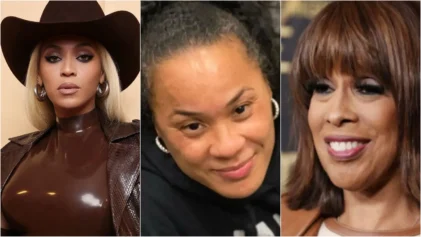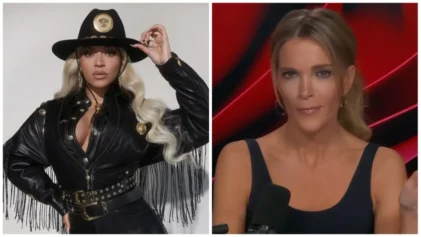Earlier this month, Beyonce capped her whirlwind month of a Destiny’s Child reunion, Inauguration controversy and Super Bowl halftime show by announcing a new world tour, dubbed “The Mrs. Carter Show”—to outrage from critics, who began labeling her an “anti-feminist,” an abandoner of girl power.
Carter, of course, references the given name of Beyonce’s husband, Jay-Z, aka Shawn Carter. Aisha Harris, of The Slate, posted one of many reactionary responses with the headline “Who Run the World? Husbands?” which proposed a question about the tour’s title: “Is this a step back in the ongoing debate about “Beyonce-as-feminist?”
Articles like Harris’s take a cheap shot at Beyonce, formulating an underdeveloped criticism that ignores her contributions (for better or worse) to a key 1990s revision of feminism—which shifted the movement’s initial focus on equality to brash girl power and brazen displays of sexuality. Feminist writer Anne Powers argued in the New York Times that Beyonce and Destiny’s Child cemented a “post-feminine” revolution where girls took on the roles and images of men to assert themselves as women.
Destiny’s Child’s lyrics, however clumsy, indeed preached an almost violent self-sufficiency. In 2001’s “Independent Woman Part 1,” the girls of Destiny state, “Try to control me boy you get dismissed/pay my own fun and I pay my own bills/always 50/50 in relationships.” Powers continues that, “Beyonce Knowles and her lieutenants in Destiny’s Child, Kelly Rowland and Michelle Williams take on the predicaments of womanhood with the determination of warriors.”
Indeed, acting like a man became commonplace for women in pop culture during the late 1990s and early 2000s, from Samantha’s rotating bed on Sex and the City to the gun-glamorizing remake of Charlie’s Angels in 2001—and Beyonce led the charge in a camouflage bikini. If anything, she received flack for taking girl power too far, by channeling her independence through skimpy clothing and seductive gyrating in videos like “Survivor,” “Diva” and “Déjà Vu.”
As a solo artist, Beyonce alternated from confident love songs like “Irreplaceable” to single girl anthems such as “Single Ladies (Put a Ring on it).” The gimmicky “Single Ladies” never fails to reach the heartstrings of the independent and soul searching—championing single women from its opening refrain.
“Single Ladies,” does contain a few contradictory feminist images, though. Beyonce calls for men to “put a ring on it” if they value a woman, upholding marriage as a worthy tradition, but slightly objectifying women in the process. Yet, she also encourages women to seek what they want and deserve in a partner, “Cause you had your turn/And now you gonna learn/ What it really feels like to miss me… Your love is what I prefer, what I deserve.”
2011’s “Who Run The World (Girls)” followed this vein of manufactured girl power—but did show some evolution in Beyonce’s philosophy of feminism. Her earlier woman warrior attitude expanded to accommodate business, marriage and children “Boy you know you love it/How we’re smart enough to make these millions/Strong enough to bare the children/Then get back to business.” With “Girls,” she seemed more interested in having it all, also a modern garnish to the classic definition of feminism.
Now, at 31 and a mother, she gives us actually a far more revealing artistic statement with “The Mrs. Carter Show,” presenting a nuanced commentary on marriage and performance. By attaching the word “show,” Beyonce suggests the role of Mrs. Carter is performative, or just an act.
Gender theory, an offshoot of feminist scholarship, argues certain gendered behaviors are forced and obligatory by society, not nature. In Gender Trouble, feminist scholar Judith Butler writes that “gender is a choice…a construction that one puts on, as one puts on clothes in the morning, ” as is the identity of “wife.”
Similarly, Beyonce argues Mrs. Carter is a mutable performance, rather than a fixed identity. The title is also a commentary on the incessant media speculation about her and Jay-Z. Between all those dinners with the Obamas and snapshots of Blue Ivy, the press constantly debates what role Beyonce plays in their marriage: is she the doe eyed wife or independent woman dominatrix?
In this vein, “The Mrs. Carter Show” is a commentary on pop culture’s labeling addiction—by the mere act of marriage, Beyonce lost her title as feminist hero. Perhaps the true triumph of the “Mrs. Carter Show” will be showing that the independent woman still exists, but is now empowered within a relationship and outside it.
The real-life smoking gun on the Carters’ relationship came quietly in 2009, when Beyonce and Jay-Z officially married. Beyonce changed her name to “Beyonce Knowles-Carter,” straddling tradition and independence in the way of many modern women.
The kicker? Jay-Z, a thugish mogul and billionaire, did the same, legally becoming “Shawn Knowles-Carter,” a fierce demonstration of equality, rather than dominance. Anti-feminist doesn’t quite fit anymore, as the diva slayed the rapper so hard he took her name and parted with his own solo identity in favor of partnership.
Thus, legally, “Mrs. Carter” is a fictive persona—one Beyonce created to get us talking about her evolution as an artist and woman, and perhaps the balance she now seeks between independent woman, wife and mother. Regardless of what name you call Mrs. Carter, it’s still undeniably her show.


